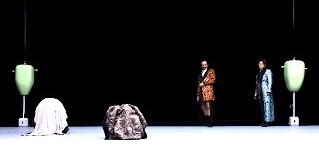dying for love
by Douglas Messerli
Ethan Braun,
Sarah Lehrer-Graiwer (composer and librettist), Adam Linder (dance and
direction) (loosely based on Bernard Marie-Koltès play In the Solitude of
the Cotton Fields) The Want / the
performance I saw, with Tm Gratkowski, was at Redcat (Roy and Edna Disney/Cal
Arts Theater) on September 19, 2019)
The new work I saw last night at Redcat (Roy
and Edna Disney/CalArts Theater) is associatively based on Bernard Marie-Koltès play In the Solitude of the Cotton Fields
about a gay-night encounter between two men during a late-night-cruising, which
I saw and reviewed in 2010 at Redcat [see My Year 2011]. As I wrote
then:
"Of course, one might immediately (as do I) wonder why a normal sexual encounter of two gays on the street should result in these strange metaphors of Marxist politics, underlined by Sadeian issues of pain and pleasure. Koltès clearly saw sex as a battle between forces and lived with a far greater sense of being an outsider than I, who joyfully encountered dozens of young men in my youth in just the manner
these two do."
For
me, as a young man in New York and the Midwest, it was simply an open pleasure,
but if you see it from the slightly Marxist lens from which the original
playwright saw it, if often did involve, as this new production presents it, as
a kind of transactional relationship, in which there was a mutual “offeree” and
“offeror.” I guess I was always both and presumed my partners were equally
seeking just such a mutual, if terribly temporary, relationship.
Fortunately, under Adam Linder’s wonderful balletic direction, Ethan
Braun’s musical creation, and Sarah Lehrer-Graiwer’s libretto, Marie-Koltès gay
investigation into such sexual transactions, has been deliciously expanded to
include both heterosexual and gay interconnections, combined with wonderful
dance, singing, and engaging quotes from unlikely sources such Jacques Derrida
and Missy Elliott, who, in this production’s mash-up of their words never
sounded better.
The real center of this work are the four major performers, Jessica
Gadani, Justin F. Kennedy, Jasmine Orpilla, and Roger Sala Reyner, who move
utterly fluidly between dance, brilliant operatic singing, and singspiel that
makes you very much care about their numerous sexual transformations, beginning
with the “Boots Are Made For Walking” introduction in which Gandani and Kennedy
come together along with Orpilla and Reyner.
Yet, just as in contemporary culture, the idea of “You will get a
trade-off, the tipping of scale, a shot in dark, that I am willing to risk,”
quickly does become “thicker, obscuring”; as in “Face-Off,” things alter,
eventually their interrelationships gradually shift, the two women casually
coming together just as the two males subtly make their sexual connections.
Not only are these sexual shifts beautiful and quite subtly displayed in
Linder’s dance directions, particularly in the leaning of the bodies and their
complex use of hand-signals, but also explored through the director’s
fascination with costume, as the quartet equally transform themselves through
time, from 20th-century S&M-like encounters back to late 19th-century
European Jewish life (“Jewy XIV”) to, in the last scene into what I might
describe as a kind of Noel Coward-like scene, where both characters, in this
case a shift again of Gandani and Reyner dressed in formal home-dressing attire
in which the two figures (while the other two apparently have become “ghosts”)
describe what was once a passionate relationship has now turned into an almost
abstract notion of an Albee-like encounter of husband and wife:
Offeree: You want compensation
for empty space between us?
Offeror: Every promise to see
infers the promise to by, and there’s
a forfeit to
pay: a pound of flesh, a sum of money.
Offeree. Now you’re
accomplishing your designs for me.
Offeror: If you run, I will
chase; if you take the wrath of my fist,
I’ll be by your
side, in your unconscious and beyond.
Offeree: I only fear
unfamiliar rules.
Offeror: Even the one language
we might share, that of money,
whilst
representing and guaranteeing that which exists, is
only a signifier
for what does not exist—for fantasy.
Offeree: Well then what
weapon?
Even Stephen Sondheim in his Follies song
“Could I Leave You” could not have said it better.
Much of the early musical score of Braun’s work, is based on a sampling
of Monterverdi’s Lamento della Ninfa played with a combination of
violins, synths, pianos, saxophones, guitars—blasting through the sound systems
of the small Redcat theater—along with a rather stunning use of light by
Shahryat Nashat— which made many of these scenes quite breathtaking. This
highly international cast, with roots in Los Angeles, Berlin, Spain, and
elsewhere contributed to the feeling that the sexual transactions which we were
experiencing on stage were truly global, something that our cultures have
increasingly ignored in an era of increased nationalism and
This opera/dance represented all of us, heterosexual, lesbian, gay, and
just confused. How to create a relationship in the complex needs of “wanting”
is really what this work is all about. The Want of its title is what
every human being seeks, and its exploration of how to find “it,” in any
possible form, is what we all have to deal with in our too human lives. It
represents transactions that we never truly comprehend or can explain.
Los Angeles, September 20, 2019
Reprinted from USTheater, Opera, and
Performance (September 2019).



.jpg)


No comments:
Post a Comment